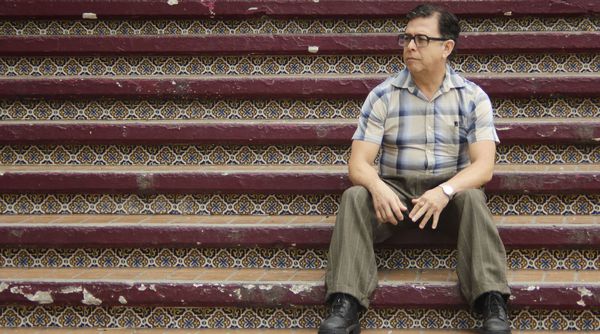Eye For Film >> Movies >> Workers (2013) Film Review
Workers
Reviewed by: Michael Pattison

“What do you need that pen for then?” asks a young lad to whom Rafael (Jesús Padilla) has just admitted his own illiteracy. Rafael’s reply: “In case someone needs one.” Resting in the breast pocket of Rafael’s shirt, the pen to which this exchange refers will feature in an amusing fantasy sequence later in the film and will do so again, in its hilarious coda, to more uplifting effect.
Rafael’s is one of two parallel plot strands in Workers, José Luis Valle’s highly impressive first fiction feature about a separated Mexican couple whose working lives are nearing their end; while Rafael has worked as a cleaner in a Phillips factory for 30 years, ex-wife Lidia (Susan Salazar) is one of two housemaids employed by a potty-mouthed ageing matriarch in Tijuana. Pending retirements are delayed, however. When Rafael broaches the subject with his boss, his illegal immigrant status is used to prolong his work, while Lidia and her colleagues (fellow housemaid, chauffeur, security guards) find themselves, when it comes to inheritance money, second in line to Princess, their boss’s mollycoddled greyhound who eats and drinks out of gold- plated bowls.

Lidia is more proactive in reaching retirement. Because her boss’s will stipulates that Princess’s death must be of natural causes in order for the inheritance to be passed on to those next in line, the domestic workforce must be creative in offing the canine; Valle’s script is also deceptive, in having a subplot cue Lidia into purchasing sulphuric acid and participating in tactfully edited bargaining scenes with fellow conspirators – only for both to turn out quite unrelated to the dog’s fate (which is perhaps even more sinister, if blackly comic).
Though they never meet, Lidia and Rafael’s narratives relate to one another through aesthetic cues. When Rafael visits a tattooist to get his planned retirement date prematurely inked onto him, we see his ex-wife’s name sprawled across his flesh. Rafael’s tattoos are themselves intended as deadpan hints at a dormant rebelliousness, more fully revealed in the film’s ten-years-on epilogue, which includes a great gag involving the top-down surveillance that is endemic in the capitalist workplace.
Valle’s deadpan comedy demonstrates a master image-maker at work. Compositions are arresting; the precise mise-en-scène comprises details in both the foreground and background of frames, and the spatial clarity is matched by an impeccable sense of timing. Labour is innately ritualistic, alienating, aestheticised – a performative act of mannered repetition. In the scene in which Rafael gets tattooed (in which the tattooist recalls a customer who got “God” tattooed onto him without paying), we hear the same ditty of an ice cream van that first appeared in the film’s best if most incongruous scene, a fixed-camera view of three shop fronts: from left to right, a barbershop, a sex shop, and a Hawaiian food stall. As the sky grows darker (with sublime cinematography from César Gutiérrez Miranda), workers and clients exchange banter and skills on society’s bottom rung; following the ice cream van’s visit, as the take continues, someone appears offering to sharpen knives for a fee, attracting the fast food chef and local youths. And then two lads cycle past to correct a spray-painted declaration of adolescent love.
Reviewed on: 01 May 2013














